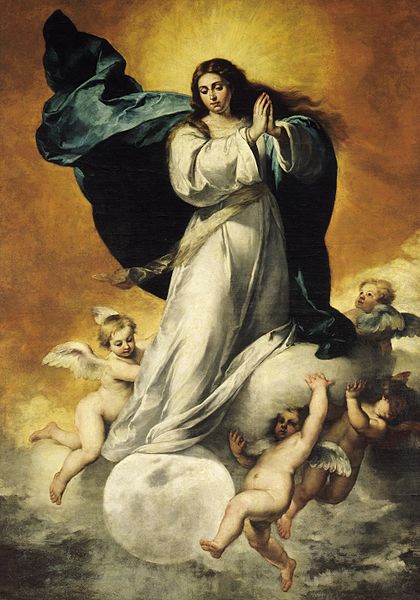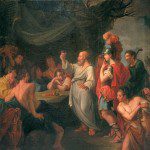
My wife and I have been listening to the Catholic Answers Live podcasts in the car (I got an iPhone for Father’s Day) together of late, and what their guest apologists (Tim Staples, Jimmy Akin, Steve Ray, etc.) are really good at, is defending our devotion to Mary. My wife, a convert from Protestantism to Catholicism, has come a very long way in understanding the Catholic devotion to Mary, especially in terms of accepting how she was conceived without Original Sin, that she had no other children, and so forth, but the one thing that she can’t grasp is how Mary could have remained sinless throughout her life. I have an idea in my head of how I could explain it to her, but I would like to hear (read) how you would or might explain it first.
Here’s how I defend it from a purely biblical standpoint:
Thanks, Dave. I do, however, have a question regarding Mary’s “grace”. I just need it to be clarified so I can better explain it to my wife (it has always made perfect sense to me, but then again I’ve always believed it and never felt the need to question it). Does Mary’s “grace” impart to more than the Immaculate Conception, i.e. because this grace was bestowed upon her, while she had the capacity to sin in life due to her human nature, did this grace make her incapable of sinning?
Great follow-up questions.
The answer is “yes” — but it needs to be immediately understood that there is a crucial distinction between Mary’s impeccability and God’s impeccability.
God cannot possibly sin because He is God and sin is an utter contradiction of God’s Nature. Mary couldn’t have sinned because God performed the very special miracle of grace: the Immaculate Conception: literally filling her with grace in a way that is almost beyond our comprehension. Sinlessness was not intrinsic to her nature (i.e., prior to and considered apart from the Immaculate Conception), as with God. Blog regular Jonathan Prejean has written eloquently about this, drawing the distinction between necessary and contingent impeccability:
No finite creature with a free will is intrinsically impeccable, because that would require either a perfect alignment between the ultimate end and the will (which is only true of God according to His divine nature) or a voluntary acceptance of that end in advance of creation (which is only true of the voluntary assumption of the human nature in the Incarnation). But the righteous angels and saints in Heaven are contingently impeccable on account of having been fixed in virtue by their initial choice (for angels) and by their state of grace at death (for saints). Likewise, it does seem entirely possible that Mary would have been contingently impeccable on account of the Immaculate Conception, and I think that is likely to be true, although it would not necessarily have to be the case.
Mary always said “yes” to God’s will, all by God’s grace, but not apart from her free will. She had a very significant “extra” aid: being “full of grace”.
I’m asking this because when I have tried to explain this to my wife, she then argues that if this is the case then it places her, Mary, on equal footing – in terms of divinity – with Jesus Christ, as if she is a deity.
She’s not on an equal footing with God because of the distinction noted above. Mary is not who she is, intrinsically, but because of the aid of God’s special and extraordinary graces in her case. Hence, The Catholic Encyclopedia (“The Blessed Virgin Mary”) asserts:
Theologians assert that Mary was impeccable, not by the essential perfection of her nature, but by a special Divine privilege. Moreover, the Fathers, at least since the fifth century, almost unanimously maintain that the Blessed Virgin never experienced the motions of concupiscence.
Mary had no concupiscence, or inclination towards, or unbalanced desire for sin, as we all do, because the effects of original sin were removed from her by a special act of God’s grace, and due to being “full of grace.” Fr. John A. Hardon, S. J. elaborates:
[S]inless Mary was impeccable, preserved by an extraordinary grace from God from ever being capable of offending God by deliberate sin. Yet though impeccable Mary was able to choose. This bears emphasis. We are so accustomed to identifying freedom as choosing between good and evil that we forget the highest use of our liberty is not to choose “not to sin”, but rather to choose to do more than we have to do or that we are obliged to do – in a word, to choose to be generous. Like Mary, then, we can choose to give God more than He demands under pain of sin. We can choose to love God with our whole heart and not just to avoid His punishment.
(The Handmaid of Humanity: Mary, Woman of Salvation History)
Likewise, fellow Jesuit Fr. Kenneth Baker asserts:
Two special factors rendered Mary impeccable or unable to sin. The first was her constant awareness of God, living always in his presence, and the second was her reception of special and extraordinary graces. These special graces made it possible for Mary to maintain a perfect harmony in her mind, will and emotions and to recognize always what was the right thing to do and then to do it.
We must not forget that Mary was “full of grace”.
(Fundamentals of Catholicism: God, Trinity, Creation, Christ, Mary, Vol. 2, San Francisco: Ignatius Press, 1983, p. 332)
The Catechism of the Catholic Church appears to concur:
492 The “splendor of an entirely unique holiness” by which Mary is “enriched from the first instant of her conception” comes wholly from Christ: she is “redeemed, in a more exalted fashion, by reason of the merits of her Son”. The Father blessed Mary more than any other created person “in Christ with every spiritual blessing in the heavenly places” and chose her “in Christ before the foundation of the world, to be holy and blameless before him in love”.
Catholic apologist David Palm wrote on one of the Catholic Answers forums (23 March 2009):
[W]e will have free wills in heaven, yet be unable to sin. That is a mystery, but unless I’m mistaken I believe the trajectory of human redemption goes:
Pre-Fall Adam/Eve – Able not to sin
Fallen human nature – Not able not to sin
The glorified in heaven – Not able to sin
By anticipation Our Lady received graces such that her whole life she lived out that final state of glorified human nature, not able to sin.
We know very well that Jesus had the capacity to sin due to his fully human nature, but did not because he was fully divine.
This is technically incorrect. He could not possibly have sinned because He is 100% God as well as 100% man. The Divine Nature is impeccable, and Jesus is a Divine Person with a perfect unity of Divine and Human Natures (the Hypostatic Union). Therefore He could not have sinned.
Oh how I wish that our Protestant brethren could grasp the true nature of our deep love for and veneration of the Blessed Virgin Mary! It’s such an extraordinarily beautiful thing. She is God’s very highest creature. Eve said “no” but she said “yes” and that led to the Incarnation that saved sinners, etc. What Eve could have done (in terms of not sinning), but did not do, Mary did. It’s not “idolatry” at all. We’re not raising Mary to Godhood in any way, shape, or form, or taking away anything from God. To the contrary, we are praising God for making Mary who she is: such a magnificent example of the true potential of human beings and what God had always intended for the human race.
When a person praises the great masterpiece of an artist, he is really praising the artist. No one would make the ridiculous statement that in praising the art, somehow we are equating the art with the artist, or acting as if it took his place or arose apart from his entire creation and “enabling” of it. So why do Protestants make the same sorts of statements about Marian veneration?
Granted, some Catholics are excessive in their veneration, but that doesn’t annihilate the whole concept of biblical veneration in thankfulness for God’s grace and mercy and love. The distortion of a thing by uneducated (though usually well-meaning) people does not mean that the thing itself is null and void.













